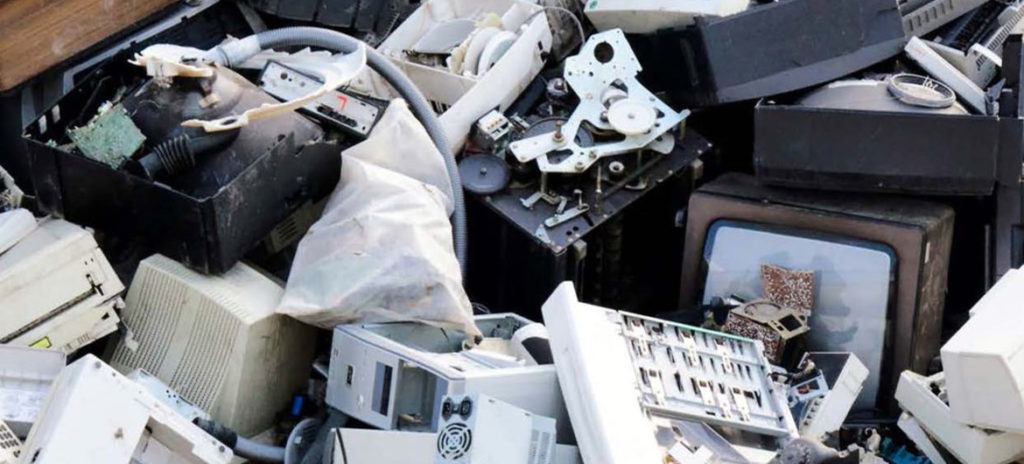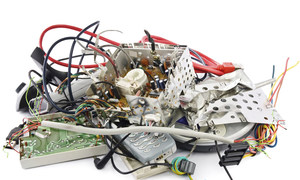Environment and Health at Increasing Risk from Growing Weight of ‘E-Waste’
ENVIRONMENT, 28 Jan 2019
UN News – TRANSCEND Media Service
Around 50 million tonnes of electronic waste, or e-waste, is being thrown away each year, according to a new joint United Nations report – which exceeds the combined weight of all the commercial airliners ever made, or alternatively, enough Eiffel Towers to fill the whole of Manhattan.
24 Jan 2019 – To highlight the rising challenge posed by mountains of discarded electronics worldwide, seven UN entities came together to launch the report at the World Economic Forum in Davos, Switzerland, on Thursday, in a bid to offer some solutions to a behemoth-sized problem that is making the world sicker and adding to environmental degradation.
The joint report, entitled, “A New Circular Vision for Electronics – Time for a Global Reboot”, calls for a new vision for e-waste based on the “circular economy” concept, whereby a regenerative system can minimize waste and energy leakage.
“E-waste is a growing global challenge that poses a serious threat to the environment and human health worldwide”, said Stephan Sicars, Director of the Department of Environment at the UN Industrial Development Organization. “To minimize this threat, UNIDO works with various UN agencies and other partners on a range of e-waste projects, all of which are underpinned by a circular economy approach”.
According to the report, a deliberative process must be instilled to change the system – one that collaborates with major brands, small and medium-sized enterprises, academia, trade unions and civil society.
Walking the talk – Considerable work is already under way to harness a circular economy. For example, the Nigerian Government, the Global Environment Facility and UN Environment announced a $2 million investment to formalize an e-waste recycling industry in Nigeria. The new investment will leverage over $13 million in additional financing from the private sector.
“Thousands of tonnes of e-waste is disposed of by the world’s poorest workers in the worst of conditions, putting their health and lives at risk”, maintained Guy Ryder, Director-General, International Labour Organization (ILO). “We need better e-waste strategies and green standards as well as closer collaboration between governments, employers and unions to make the circular economy work for both people and planet.”
Despite growing e-waste, “A New Circular Vision” points to the importance of technologies from the so-called Internet of Things – a network of devices that contain electronics and the connectivity that allows them to exchange data – through to cloud computing advances, which can all result in smarter recycling and tracking of e-waste.
“A circular economy brings with it tremendous environmental and economic benefits for us all” said Joyce Msuya, Acting Executive Director, UN Environment Programme (UN Environment). “Our planet’s survival will depend on how well we retain the value of products within the system by extending their life.”
The report supports the work of the E-waste Coalition, which includes International Labour Organization (ILO); International Telecommunication Union (ITU); United Nations Environment Programme (UN Environment); United Nations Industrial Development Organization (UNIDO); United Nations Institute for Training and Research (UNITAR); United Nations University (UNU) and Secretariats of the Basel and Stockholm Conventions.
DISCLAIMER: The statements, views and opinions expressed in pieces republished here are solely those of the authors and do not necessarily represent those of TMS. In accordance with title 17 U.S.C. section 107, this material is distributed without profit to those who have expressed a prior interest in receiving the included information for research and educational purposes. TMS has no affiliation whatsoever with the originator of this article nor is TMS endorsed or sponsored by the originator. “GO TO ORIGINAL” links are provided as a convenience to our readers and allow for verification of authenticity. However, as originating pages are often updated by their originating host sites, the versions posted may not match the versions our readers view when clicking the “GO TO ORIGINAL” links. This site contains copyrighted material the use of which has not always been specifically authorized by the copyright owner. We are making such material available in our efforts to advance understanding of environmental, political, human rights, economic, democracy, scientific, and social justice issues, etc. We believe this constitutes a ‘fair use’ of any such copyrighted material as provided for in section 107 of the US Copyright Law. In accordance with Title 17 U.S.C. Section 107, the material on this site is distributed without profit to those who have expressed a prior interest in receiving the included information for research and educational purposes. For more information go to: http://www.law.cornell.edu/uscode/17/107.shtml. If you wish to use copyrighted material from this site for purposes of your own that go beyond ‘fair use’, you must obtain permission from the copyright owner.


